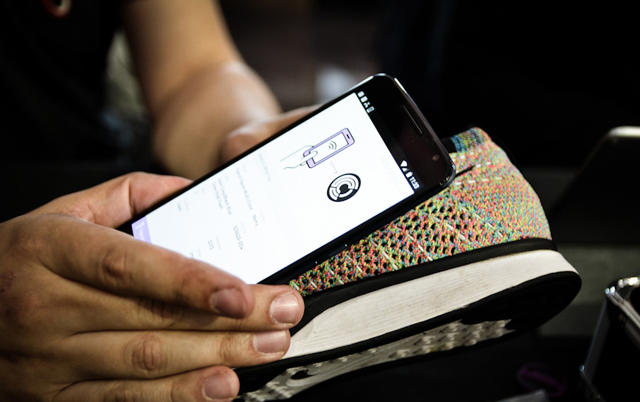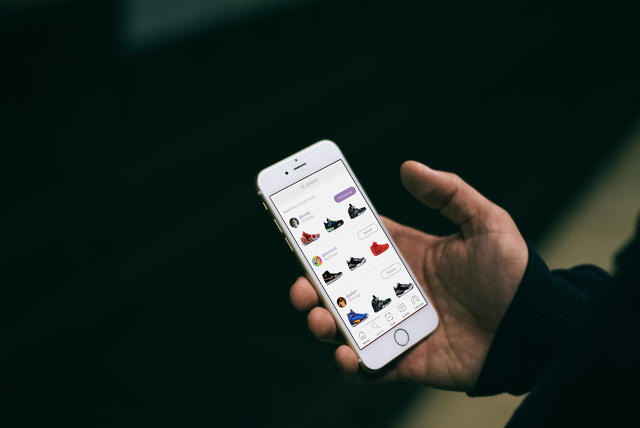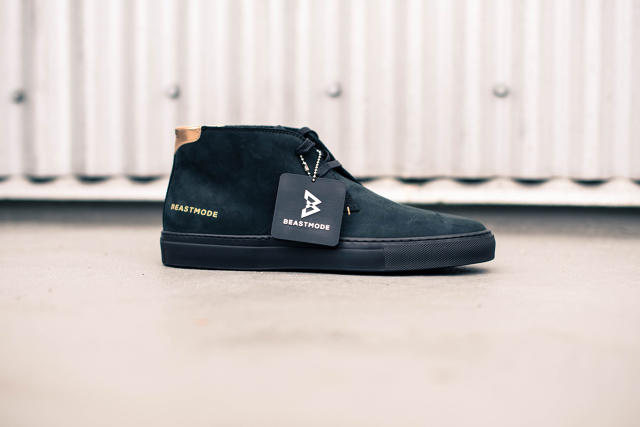Every year, as much as $100 million in counterfeit sneakers is seized by U.S. customs alone. And that's just scratching the surface: Worldwide, counterfeit fashion is estimated to be a $600 billion industry, and if U.S. customs figures are accurate, about 40% of all counterfeit goods are sneakers. That makes counterfeit kicks a $240 billion problem to sneaker makers like Nike, Adidas, Converse, and more.
So if you're a small brand like Brooklyn-born Greats, and you've convinced NFL superstar Marshawn Lynch to endorse a pair of your sneakers, how do you prevent the $149 design from being counterfeited? You embrace technology popularized by Bitcoin to create 3-D printed smart tags that can track any pair of the new Greats x Beastmode 2.0 Royale Chukkah sneakers back to the factory—and which are impossible to fake.

A Brief History Of Knock-Off Kicks
Anti-counterfeiting technology in the fashion world has traditionally relied on two things. First, manufacturing process: The more complicated it is to manufacture something, the harder it is for counterfeiters to duplicate that process cost effectively. But material science also plays a factor. Take Nike's Flyknit shoes. The result of four years of research and development, Nike required entirely new machines to be built to Flyknit pairs of sneakers like socks. Consequently, Flyknits are right now pretty much the only sneakers on the market that experts can tell apart from a quality pair of counterfeits.
But in both material science and manufacturing, time is ultimately on the side of the counterfeiters. Any pattern that a licensed Chinese factory can mass produce, a counterfeit factory can also eventually make just as well, and at a cheaper price, since they don't need to recoup marketing or R&D expenses. This makes counterfeiting in the sneaker world is particularly damaging, since the market puts such a premium on vintage kicks—shoes that are trivial for counterfeiters to fake after years of advances in material science and manufacturing.
Companies have tried to give buyers an assurance that they're buying the real thing through elaborate seals and certificates of authenticity, but these too can be faked.

A Solution From A Cryptocurrency
To break this pattern, Greats turned to two companies, Chronicled (a sneaker and fashion software authentication company) and Origin (a San Francisco 3-D printing manufacturer), to design smart tags for their new Beast Mode sneakers.
Each 3-D printed smart tag has a unique identifying code stamped into it, linking it to a specific pair of shoes, but it's what is inside this smart tag that really counts: a small encrypted NFC chip like the one found inside a modern passport, which can be tracked just by scanning it with your phone. Because this chip is baked into the smart tag during the 3-D printing process, it's impossible to break it out of the plastic without destroying it. But none of this would matter without the software.
Reduced to its essence, the problem facing those who would design a system to thwart counterfeiters is this: How do you allow anyone purchasing that product to easily track it through countless middlemen back to its source of origin? What Chronicled realized was that someone has already solved this problem: Satoshi Nakomoto, the enigmatic inventor of the digital currency Bitcoin. His solution to make sure that Bitcoins couldn't be counterfeited was to authenticate them through something called a blockchain, an encrypted database that inseparably links every Bitcoin transaction to the one that preceded it. If you have a Bitcoin, the blockchain not only authenticates it, it can tell you anyone who ever spent it.

Chronicled and Origin have done something clever. They've created their own blockchain, specifically dedicated to sneaker transactions, treating each smart tag almost like a Bitcoin. When you scan a smart tag with the mobile app, it not only tells you if it's authentic, it will tell you everyone who ever owned that pair of sneakers. If you sell your sneakers later, you just transfer ownership of the smart tag within the Chronicled app—again, just like Bitcoin. And at a few bucks each, tags aren't too expensive for sneakers manufacturers to include.
The Greats x Beastmode 2.0 Royale Chukkah was the first consumer item to come with a Bitcoin-like smart tag, but Chronicled wants to bring its smart tags to more than just sneakers. Dynes, a high-end fashion label, plans to also incorporate the technology later this year. Chronicled is also trying to market its smart tags to the vintage sneakers aftermarket, so those companies can assure their customers of authenticity; sneakers sold without a smart tag at purchase would need to be authenticated directly through Chronicled before they were assigned a smart tag.
There will always be people for whom authenticity is an afterthought, and who really just want something close enough at a good price, so Bitcoin technology isn't likely to stop counterfeiting for good. But if it catches on, smart tags will make it impossible for counterfeiters to charge a premium by claiming their fakes are authentic.